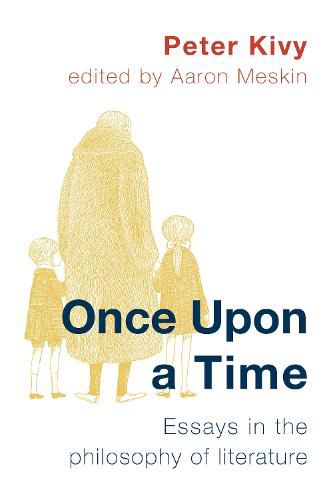Readings Newsletter
Become a Readings Member to make your shopping experience even easier.
Sign in or sign up for free!
You’re not far away from qualifying for FREE standard shipping within Australia
You’ve qualified for FREE standard shipping within Australia
The cart is loading…






Once Upon a Time is a collection of essays in the philosophy of literature with two central themes: the significance of story -telling for us and the question of whether the novel, perhaps the art form most closely associated with story-telling, is a legitimate source of human knowledge. Leading philosopher of art Peter Kivy explores why human beings are so enthralled by being told stories and whether story-telling is a significant source of knowledge. Starting with a study of Aristotle’s Poetics, Kivy then undertakes a critical discussion of Noel Carroll’s suggestion that our interaction with the artists of the past is a kind of conversation. He goes on to defend the thesis that one of the legitimate artistic pleasures we take in novel-reading is the acquiring of knowledge and, furthermore, that the silent reading of a novel is a kind of performance, making the novel one of the performing arts. The volume concludes with a chapter about jokes, and, in particular, whether it is immoral to tell or be amused by an immoral joke. This volume of essays is a must-read for anyone seriously interested in literature and the conceptual problems it may raise for philosophers.
$9.00 standard shipping within Australia
FREE standard shipping within Australia for orders over $100.00
Express & International shipping calculated at checkout
Once Upon a Time is a collection of essays in the philosophy of literature with two central themes: the significance of story -telling for us and the question of whether the novel, perhaps the art form most closely associated with story-telling, is a legitimate source of human knowledge. Leading philosopher of art Peter Kivy explores why human beings are so enthralled by being told stories and whether story-telling is a significant source of knowledge. Starting with a study of Aristotle’s Poetics, Kivy then undertakes a critical discussion of Noel Carroll’s suggestion that our interaction with the artists of the past is a kind of conversation. He goes on to defend the thesis that one of the legitimate artistic pleasures we take in novel-reading is the acquiring of knowledge and, furthermore, that the silent reading of a novel is a kind of performance, making the novel one of the performing arts. The volume concludes with a chapter about jokes, and, in particular, whether it is immoral to tell or be amused by an immoral joke. This volume of essays is a must-read for anyone seriously interested in literature and the conceptual problems it may raise for philosophers.